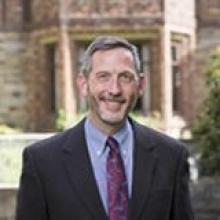In the beginning there was a fish, filled with Greek letters and symbolizing Jesus. When “Darwin-” and “Evolve-” fish parodies cropped up in the 1980s, they popularized the notion that religion and science are incompatible. In recent years, ever-more polarized culture wars have reinforced the assumption that there is an insurmountable gulf between science and religion.
But WPI doesn’t accept that stereotype.
“There’s a common narrative told about STEM students—that they are exclusively interested in empirical processes. And yet when you flesh out their humanity and really look at the threads of what they think about, there’s so much richness and depth,” says Kalvin Cummings, WPI’s inaugural assistant director for religion and spiritual life.
That richness and depth looks different for each student at WPI. But for many, it includes a worldview rooted in religious values or spiritual traditions that students bring with them to campus. As with other components of their lives, students may be questioning or expanding those values and traditions as they mature.

peace pole installed this year outside
the Collegiate Religious Center.
That’s why, in 2022, following campuswide discussions about mental health and holistic wellness, the university created a dedicated staff position, distinct from volunteer chaplains (see sidebar, below), to oversee religious and spiritual life on campus.
“It was a way of acknowledging that students are actively exploring the role that faith or spirituality might play in their lives and providing resources to support them in that process,” says Philip Clay, senior vice president for student affairs and enrollment management. In the spring of 2023, 47 percent of WPI undergraduates reported identifying with a specific religious, spiritual, or philosophical tradition.
“College years are a time when students are becoming themselves. It’s a time of sifting and sorting your upbringing, your values and beliefs, and making decisions about who you are going to be going forward,” Clay continues. “Part of that, for students raised in a faith tradition, is deciding if they are going to go to worship, continue to have fellowship with people from that faith tradition, or explore a new faith. For students who weren’t raised in a faith tradition, that sifting and sorting may involve discovering a belief system they hadn’t thought of before.”
Being welcoming to and available for students from all backgrounds is a big reason Cummings often talks about “meaning-making practices” instead of traditional and formal religions.
“There’s a universality to meaning-making practice, and I try to represent that all paths where students are thinking about what gives their lives meaning are good paths,” says Cummings. “When students come to the Collegiate Religious Center, we don’t ask them to be religious or to participate in any specific programming. We just don’t ask them to leave their religious or religio-cultural traditions and meaning-making practices at the door.”
It’s common these days for colleges to have chaplains from multiple faith backgrounds. Even schools with historic ties to a single religious tradition, like Brandeis University and Boston University, provide diverse faith resources for their students. But WPI is somewhat unique—especially among STEM-focused institutions—in formally recognizing, by way of a dedicated staff position, that religious expression can be a central part of the community’s diversity and that spiritual practice can be part of a student’s well-being.
For example, some students, regardless of their field of study, feel more comfortable talking with a chaplain or spiritual advisor than with a therapist or mental health counselor. Some need special dietary options and scheduling flexibility to remain observant to their faith traditions. Still others are simply homesick for traditions they grew up with.
A Home Away from Home
That’s exactly why Aarsh Zadaphiya ’25, a computer science major from Mumbai, India, established a WPI chapter of Hindu YUVA (Youth for Unity, Virtues, and Action).
“During my sophomore year, I decided to start a community on campus that gives a platform to students to express themselves and be involved in things that will make them feel at home,” he says. “Initially I was thinking of an Indian student organization, but later I realized that to have a meaningful impact on the entire campus community—not only on students—it made more sense to follow my Dharma, a term with Sanskrit roots that relates to religion, morals, responsibility, and duty.”







